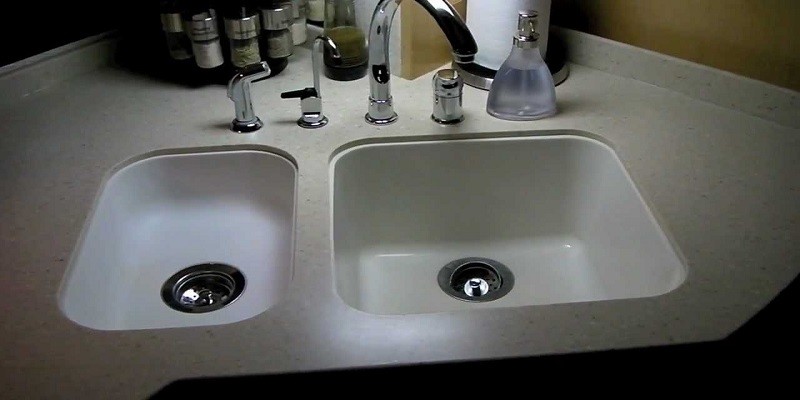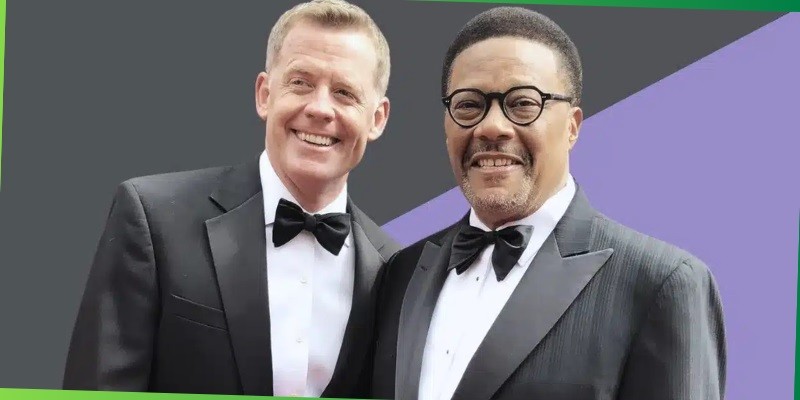Last Updated on October 18, 2023
To clean a corian sink, start by wiping the surface with a soft cloth and mild dish soap. Then, rinse the sink thoroughly with warm water and dry with a clean towel.
For stubborn stains, use a non-abrasive cleaner or a mixture of baking soda and water to gently scrub the area. Avoid using harsh chemicals or abrasive sponges, as they can damage the surface. Regularly cleaning and maintaining your corian sink will help keep it looking its best for years to come.
Corian sinks are a popular choice for kitchens and bathrooms due to their durability and aesthetics. However, like any other sink, they can accumulate dirt, stains, and grime over time. Cleaning a corian sink is a simple process that can be done using everyday household products. We will discuss how to clean a corian sink effectively, without causing any damage to the surface. By following these steps, you can keep your corian sink looking shiny and spotless for years to come.

Credit: www.sosimpleideas.com
The Corian Sink Material
Corian sinks are a popular choice for many homeowners due to their durability, versatility, and sleek appearance. Made from a solid surface material composed of acrylic polymer and natural minerals, corian sinks offer a range of benefits. Here’s what you need to know about this remarkable material:
Advantages Of Corian Sinks:
- Non-porous surface: Corian sinks have a non-porous surface, which means that they are resistant to stains, mold, and mildew. This makes them incredibly easy to clean and maintain.
- Seamless design: One of the standout features of corian sinks is their seamless design. With no visible seams or joints, these sinks create a sleek and streamlined look that enhances the overall aesthetic of your kitchen or bathroom.
- Wide range of colors and styles: Corian sinks are available in a wide variety of colors and styles, allowing you to choose a sink that complements your existing décor. Whether you prefer a classic white sink or a bold, vibrant color, there’s a corian option to suit your taste.
- Heat and impact resistant: Corian sinks are highly resistant to heat and impact, making them a practical choice for busy kitchens. They can withstand hot pots and pans without getting damaged, and accidental impacts are less likely to cause chips or cracks.
- Repairable: In the event of any damage to your corian sink, it can be repaired easily. The material can be sanded, buffed, and polished to restore its original appearance, eliminating the need for costly replacements.
Common Issues With Corian Sinks:
- Scratches: Although corian sinks are durable, they are not completely scratch-resistant. It’s possible for the sink’s surface to get scratched by abrasive materials or sharp objects. However, minor scratches can usually be polished out.
- Stains: While corian sinks are resistant to staining, certain substances such as coffee, tea, or strong dyes may leave marks if not cleaned promptly. Regular cleaning and maintenance can prevent stains from setting in.
- Heat damage: While corian sinks are heat resistant to a certain degree, placing extremely hot pots or pans directly on the surface can cause discoloration or even melt the material. It’s advisable to use trivets or hot pads to protect the sink from high heat.
Why Regular Cleaning Is Important:
- Maintaining hygiene: Regular cleaning of your corian sink helps to prevent the growth of bacteria and other harmful microorganisms that can accumulate over time. By keeping your sink clean, you contribute to a healthier living environment.
- Preventing stains and discoloration: Consistent cleaning ensures that any spills or splatters are promptly removed, preventing potential staining or discoloration of the sink surface.
- Preserving the sink’s longevity: Proper cleaning and care of your corian sink significantly extend its lifespan. Regular maintenance helps prevent damage and keeps the sink looking as good as new for years to come.
Remember, understanding the corian sink material is essential for proper care and maintenance. By considering its advantages and being aware of potential issues, you can make an informed decision when it comes to cleaning and preserving your corian sink’s beauty and functionality.
Essential Cleaning Supplies
Gentle Cleaners Suitable For Corian Sinks
- Corian sinks require gentle cleaners to avoid damaging the surface.
- Look for cleaners specifically designed for corian sinks.
- Choose mild, non-abrasive cleaners to prevent scratches.
- Avoid using harsh chemicals or abrasive cleaners that can deteriorate the sink’s finish.
- Gentle cleaners will effectively remove stains and keep your corian sink looking fresh.
Non-Abrasive Scrubbing Materials
- When cleaning your corian sink, opt for non-abrasive scrubbing materials.
- Use soft-bristle brushes or non-abrasive scrub pads to avoid scratching the surface.
- Nylon or plastic scrubbing tools are suitable for gently scrubbing away tough stains.
- Avoid using steel wool or abrasive scrubbing pads that can damage the sink’s delicate finish.
- Non-abrasive scrubbing materials will help preserve the quality and appearance of your corian sink.
Soft Cloth Or Sponge For Wiping
- To wipe your corian sink, use a soft cloth or sponge.
- Microfiber cloths are ideal for gently wiping the sink’s surface.
- Soft sponges, specifically designed for delicate surfaces, can also be used.
- Avoid using rough or abrasive materials that can leave scratches or marks.
- A soft cloth or sponge will ensure a clean and polished look for your corian sink.
Protective Gloves For Safety
- Ensure your safety by wearing protective gloves when cleaning your corian sink.
- Protective gloves will shield your hands from harmful chemicals in cleaners.
- Choose gloves made of materials such as latex or nitrile.
- Properly fitting gloves offer dexterity and protect your skin from irritation.
- Prioritize safety and always wear protective gloves when cleaning your corian sink.
Step-By-Step Cleaning Process
How To Clean Corian Sink?
Preparing The Sink For Cleaning:
- Clear the sink of any dishes or debris to create an empty surface for cleaning.
- Place a rubber mat in the sink to protect it from scratches during the cleaning process.
Cleaning The Sink Surface:
- Apply an appropriate cleaner specifically designed for corian sinks.
- Gently scrub the sink surface using a non-abrasive sponge or cloth to remove any stains or build-up.
Paying Attention To Problem Areas:
- Give extra attention to areas with stubborn stains or heavy build-up.
- Use a gentle scrubbing motion and a bit more cleaner if needed to tackle these problem areas.
Removing Hard Water Stains:
- Apply a mixture of equal parts distilled white vinegar and water to the affected areas.
- Allow the mixture to sit for a few minutes before gently scrubbing away the hard water stains.
Treating Stubborn Stains Or Discoloration:
- For stubborn stains or discoloration, try using a paste made from baking soda and water.
- Apply the paste on the affected areas and let it sit for at least 15 minutes before scrubbing gently.
Rinsing And Drying The Sink:
- Thoroughly rinse off the cleaner or any other cleaning solution with warm water.
- Dry the sink with a clean, soft cloth to prevent water spots and maintain its shine.
By following these simple steps, you can keep your corian sink clean and free from stains, ensuring it looks as good as new for years to come. Remember to use appropriate cleaning products and avoid abrasive materials that may damage the sink’s surface.
Regular cleaning and maintenance will help preserve the beauty and functionality of your corian sink.
Preventive Measures For Corian Sink Care
Regular maintenance tips:
- Clean your corian sink regularly to prevent the buildup of dirt, grime, and stains.
- Use warm, soapy water and a soft cloth or sponge to wipe down the surface of the sink.
- Rinse thoroughly to remove any soap residue.
- Dry the sink using a clean, lint-free cloth to prevent water spots.
Avoiding harsh chemicals and abrasive materials:
- Avoid using harsh chemicals and abrasive cleaners on your corian sink as they can damage the surface and cause discoloration.
- Instead, opt for mild, non-abrasive cleaners that are specifically formulated for use on corian surfaces.
- Read the labels of cleaning products carefully to ensure that they are safe for use on corian.
Using cutting boards and trivets to prevent scratches:
- When using your corian sink for food preparation, always use a cutting board to prevent scratches.
- Avoid placing hot pans directly on the sink surface. Use trivets or hot pads to protect the sink from heat damage.
Tips for removing tough stains:
- For stubborn stains, create a mixture of baking soda and water to form a paste.
- Apply the paste to the stained area and gently scrub using a soft cloth or sponge.
- Rinse thoroughly and dry the sink.
Natural remedies for specific stains:
- For hard water stains, mix equal parts white vinegar and water. Apply the solution to the stained area and let it sit for a few minutes before rinsing and drying the sink.
- To remove rust stains, create a paste using lemon juice and cream of tartar. Apply the paste to the stained area, leave it on for a few minutes, then scrub and rinse.
Seeking professional help if necessary:
- If you encounter deep scratches, severe stains, or any other significant damage to your corian sink, it is best to seek professional help.
- Professional refinishers have the expertise and tools to restore your sink to its original condition.
Remember, following these preventive measures and regular care will help keep your corian sink looking clean and beautiful for years to come.
Final Thoughts And Tips
Your corian sink is a beautiful addition to your kitchen, offering both durability and sophistication. To keep it looking pristine and ensure its longevity, it’s important to establish proactive cleaning habits. By following a few simple steps, you can enjoy the beauty of a clean corian sink for years to come.
Here are some final thoughts and tips to consider:
Maintaining The Longevity Of Your Corian Sink:
- Use non-abrasive cleaners: Harsh and abrasive cleaners can damage the surface of your corian sink. Opt for non-abrasive cleaners that are specifically designed for use on solid surface materials.
- Avoid abrasive scrubbers: Similarly, avoid using rough scrub pads or abrasive sponges that can leave scratches on the surface of your sink. Instead, choose soft microfiber cloths or non-abrasive sponges.
- Wipe off spills promptly: Corian is a non-porous material, which means it is resistant to stains. However, it’s still important to clean up spills promptly to prevent any potential discoloration or staining.
- Rinse thoroughly: After using any cleaning product on your sink, make sure to rinse it thoroughly with water. Lingering residue from cleaners can dull the surface over time.
- Protect from extreme heat: While corian is heat-resistant, it’s best to avoid exposing it to extreme heat. Use trivets or hot pads when placing hot pans or pots on the sink surface to prevent any potential damage.
Proactive Cleaning Habits For A Pristine Sink:
- Regular cleaning routine: Establish a regular cleaning routine for your corian sink, including a quick wipe-down after each use. This will help prevent the buildup of dirt, grime, and soap residue.
- Gentle cleaning techniques: Use gentle cleaning techniques to keep your sink looking its best. Mild dish soap and warm water are usually sufficient for day-to-day cleaning. For tougher stains, consider using a baking soda paste or a mild abrasive cleaner recommended for use on corian.
- Avoid leaving standing water: After each use, make sure to wipe down the sink and remove any standing water. This will prevent the accumulation of minerals and water spots, keeping your sink looking clean and shiny.
- Regularly dry the sink: Drying your corian sink after cleaning or use will help prevent water spots and maintain its lustrous appearance. Consider using a soft, lint-free cloth to ensure a streak-free finish.
Enjoying the beauty and durability of a clean corian sink is within your reach. By incorporating these tips into your cleaning routine, you can keep your sink looking pristine for years to come. Remember to use non-abrasive cleaners, establish proactive cleaning habits, and protect your sink from extreme heat.
With a little care and attention, your corian sink will continue to shine as the centerpiece of your kitchen.
Frequently Asked Questions Of How To Clean Corian Sink?
How Do I Clean A Corian Sink?
To clean a corian sink, use a mild dish soap and warm water. Scrub gently with a soft sponge or cloth.
Can I Use Bleach On A Corian Sink?
Avoid using bleach on a corian sink as it can damage the surface. Stick to non-abrasive cleaners and avoid harsh chemicals.
How Do I Remove Stains From A Corian Sink?
For stubborn stains on a corian sink, create a paste of baking soda and water. Apply it to the stain, scrub gently, and rinse thoroughly.
Can I Use Abrasive Cleaners On A Corian Sink?
It’s best to avoid abrasive cleaners on a corian sink as they can cause scratches. Stick to non-abrasive options for cleaning.
How Do I Maintain The Shine Of A Corian Sink?
To maintain the shine of a corian sink, regularly clean it with a non-abrasive cleaner and dry it thoroughly after each use.
Conclusion
To sum up, maintaining a clean and shiny corian sink is not a difficult task if you follow the right steps and use the appropriate cleaning agents. Regularly wiping down your sink with a mixture of mild soap and warm water, or a non-abrasive cleaner specifically designed for corian surfaces, will help to prevent the build-up of stains and grime.
Additionally, for tougher stains or deep cleaning, you can use a baking soda paste to gently scrub the surface. Remember to thoroughly rinse the sink after cleaning and dry it with a soft cloth to avoid water spots. By incorporating these simple cleaning practices into your routine, your corian sink will continue to look beautiful and pristine for years to come.
So, go ahead and give your sink the love it deserves with a regular cleaning regimen that will keep it shining and sanitary.










